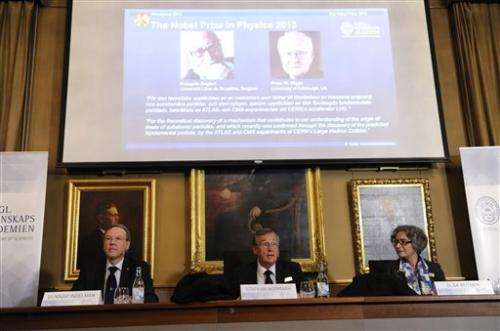Chairman Gunnar Ingelman, left, permanent secretary Staffan Normark, center, and board member Olga Botner of the Royal Swedish Academy of Sciences announce the 2013 Nobel Prize in Physics is awarded to British physicist Peter Higgs and Belgian theoretical physicist Francois Englert during a press conference at the Royal Swedish Academy of Sciences in Stockholm, Sweden, Tuesday Oct. 8, 2013. (AP Photo/Erik Martensson, TT News Agency)
The Nobel Prize judges delayed the announcement of the physics winner by an hour Tuesday—but they can't say why for 50 years.
Peter Higgs and Francois Englert won the 2013 award for their theory about how subatomic particles acquire mass.
Here's a glance explaining the secretive Nobel process and the complicated task of rewarding no more than three people when a discovery is claimed by many more.
HOW ARE NOBEL PRIZE WINNERS SELECTED?
Each prize—medicine, physics, chemistry, literature, peace and economics—has its own prize committee. Those panels receive up to hundreds of submissions each year from people with nomination rights. For physics, they include professors at selected universities, previous laureates and the 615 members of the Royal Swedish Academy of Sciences. The academy's six-member Nobel Committee for physics spends months investigating each year's nominations with the help of specially appointed experts. The committee then recommends up to three winners, who must be formally approved by the full academy in a majority vote on the day of the announcement, which is normally in October. Academy officials try to call the winners right before they announce their decision at a news conference.
WHY WAS THE ANNOUNCEMENT DELAYED TUESDAY?
The Nobel announcements are delivered right on schedule most of the time. If they are late, it's rarely by as much as an hour. In 2008, the physics judges missed their deadline by a half hour and the chemistry committee had a more than one-hour delay in 1990. Academy members don't want to say why because their deliberations are supposed to be kept secret for 50 years—one of the many peculiarities of the Nobel process.
The academy's permanent secretary, Staffan Normark, told The Associated Press the academy met Tuesday at 9:30 a.m. in Stockholm, 2 hours and 15 minutes before the scheduled announcement, but the discussions took longer than expected. He said the academy should perhaps meet at 8:30 a.m. in the future.
"It takes time. This is one of the biggest prizes," he said. "There were many people who had a lot to say." He also said the academy couldn't reach Higgs, one of the winners, before the announcement, but wouldn't say whether that's what caused the delay.
WHAT MAKES IT DIFFICULT TO SELECT WINNERS?
Many scientific discoveries are group efforts but a Nobel Prize can be shared by no more than three people, according to the Nobel statutes. So deciding who has made the most significant contribution can be difficult.
Many outside experts had speculated that Higgs and Englert would win this year's prize, but some had thought the committee would also include someone from the CERN laboratory in Geneva. That's where the particle that Higgs and Englert had predicted in their theories was actually discovered last year. The problem was that thousands of scientists were involved in those CERN experiments.
Nobel Prizes can be given to organizations instead of people—the Nobel Peace Prize committee does it a lot—but it's never been done for any of the science awards. Academy officials wouldn't say why they left out CERN or its scientists, sticking to their tradition of only talking about those who won.
At least for the next 50 years.
© 2013 The Associated Press. All rights reserved.




















